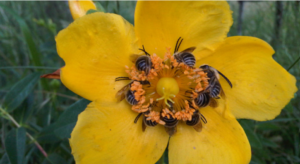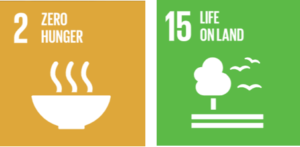
When you close your eyes in a park or a meadow or your backyard in the summer you will hear all kinds of chirping, buzzing and shuffling. Most of these sounds don’t provoke any action inside us, but a certain kind of buzzing can give you a fight or flight reaction from the bottom of your stomach and cause mild to frightening panic. However scary, this buzzing sound is essential to life on earth; for humans and for other species. It is of course the buzzing of a bee. During this pandemic time, we might want the bees to comply the social distancing rules but let me tell you why you shouldn’t smack the little fella dead if it comes too close!
May 20th is the World Bee Day, when the importance of this marvelous insect is recognized, and the importance of its protection promoted. In fact, more than 75% of the world’s food crops depend on animal pollination. On top of that, on wild flowering plant species the percentage is almost 90. This means that pollination is essential for the survival of our planet’s ecosystem, conserving biodiversity and food security, and therefore also our survival. Even though we depend on them, our current actions are threatening their existence. Nearly 35% of invertebrate pollinators like bees, face extinction due to human actions that include intensive farming practices, land-use change, mono-cropping and pesticides. Also, higher temperatures caused by anthropogenic climate change threatens bees.
Because so vast percentage of the world’s plant species depend on pollinators like bees, butterflies, bats and hummingbirds, World Bee Day is closely linked to UN’s Sustainable Development goals “15. Life on Land” about maintaining a vibrant ecosystem, but also to goal “2. Zero Hunger”.

Bees help to ensure food security for the constantly growing population on this planet. Active pollination ensures nutrition rich diet, because so many fruits, nuts and vegetables depend on pollination. In addition, decrease or imbalance in pollination can cause misshaped or bland fruits or veggies. In regulated world market, misshapen fruits are unfortunately currently in great numbers thrown away. Wild bees are also important for people, whose livelihoods depend on forests.
In Finland, nearly one in five the most important invertebrate pollinators are endangered. In Finland the biggest threat has been land-use change. When 50 years ago there were meadows nearly everywhere, nowadays these fields that are so crucial to pollinators are in intensive agricultural use, build on or overgrown. Meadows are the most threatened natural habitats in Finland.
So, now we know why bees are so important to us and to our ecosystems, but what can we do to protect our buzzing friends?
- planting a diverse set of native plants, which flower at different times of the year;
- buying raw honey from local farmers;
- buying products from sustainable agricultural practices;
- avoiding pesticides, fungicides or herbicides in our gardens;
- protecting wild bee colonies when possible;
- making a bee water fountain by leaving a water bowl outside;
- helping sustaining forest ecosystems;
- raising awareness around us by sharing this information within our communities and networks; The decline of bees affects us all!
Nina Hokkala
Vice-Chair of TAYK ry
References and more information:
- United Nations (2020), World Bee Day 20 May. Available: <https://www.un.org/en/observances/bee-day>
- Food and Agriculture Organization of the United Nations (2020), Bee-ing grateful to our pollinatiors. Available: < http://www.fao.org/fao-stories/article/en/c/1127922/>
- Asikainen, Hanna (2.4.2020), Pölyttäjien määrä on romahtanut – ja siitä voi tulla ihmiskunnan kohtalonkysymys. Yle, Article. Available: <https://yle.fi/aihe/artikkeli/2020/04/01/polyttajien-maara-on-romahtanut-ja-siita-voi-tulla-ihmiskunnan-kohtalonkysymys>
Pictures: http://www.fao.org/fao-stories/article/en/c/1127922/ and http://www.fao.org/zhc/detail-events/en/c/329095/
